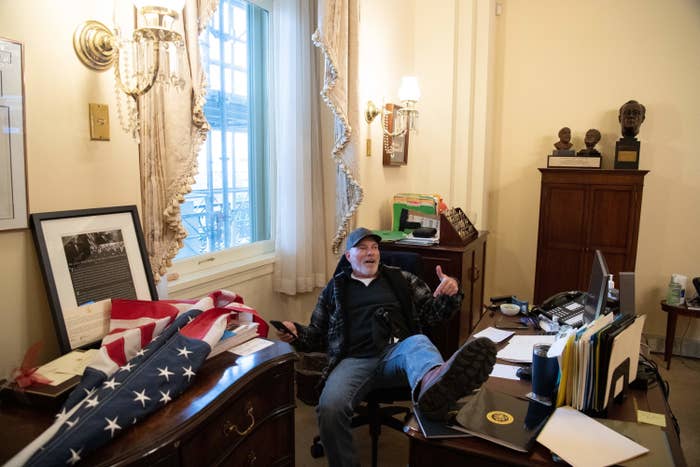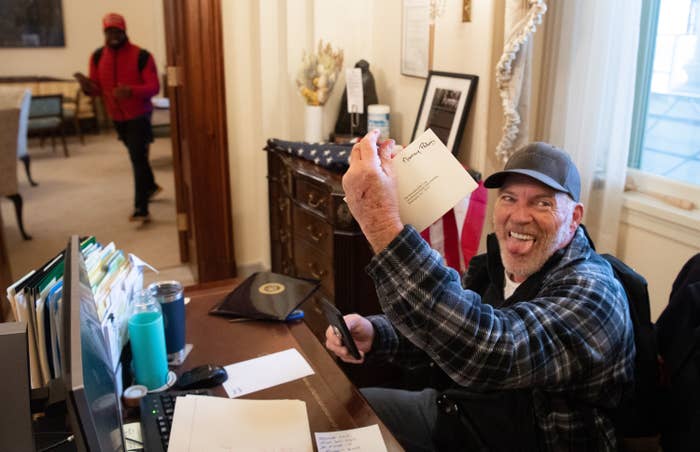
WASHINGTON — A federal judge in Washington on Thursday ordered Richard Barnett — the Arkansas man photographed sitting with his foot up in House Speaker Nancy Pelosi's office during the Jan. 6 insurrection — held in jail while his case goes forward, practically spitting out the words in anger as she announced her decision from the bench.
"His entitled behavior ... shows a total disregard for the law and for officials' directives," US District Chief Judge Beryl Howell said. "A total disregard for the US Constitution."
Prosecutors had appealed to Howell after a federal magistrate judge in Arkansas on Jan. 15 denied their request to keep Barnett in custody pending trial and ordered house arrest instead. Howell said Thursday that the crimes Barnett was charged with were "too benign" on their face to capture the scope of what he and others charged with participating in the insurrection did on Jan. 6. Barnett is facing one felony count of bringing a dangerous weapon into the Capitol — a stun device shaped like a walking stick — as well as two misdemeanor counts for violent entry and disorderly conduct on Capitol grounds and theft of government property; he was photographed outside the Capitol holding up an envelope that he said he had taken from Pelosi's office.
"What happened on that day is criminal activity that is destined to go down in the history books of this country," Howell said. "This was not a peaceful protest. Hundreds of people came to Washington, DC, to disrupt the transition of power and to thwart Congress, a branch of the federal government, in carrying out its duties, in fulfilling its constitutional task of officially certifying the votes of the Electoral College."
Howell said that DC residents were still living with the "consequences" of the assault on the Capitol, noting the deployment of the National Guard leading up to President Joe Biden's inauguration. The evidence against Barnett was "overwhelming," she said, describing how he "strutted" into Pelosi's office and "felt so entitled he put his feet on the desk" and took her mail. Howell is no stranger to the Capitol — years before becoming a federal judge in 2010, she spent a decade working for the Senate Judiciary Committee.
"Brazen, entitled, dangerous," the judge said of Barnett.

During Barnett's first detention hearing in Arkansas, his lawyer presented friends and family members as character witnesses. Howell was unpersuaded, saying many of the witnesses didn't seem to know Barnett well, and it appeared his wife had tried to hide evidence. Although Barnett didn't have a previous criminal record, Howell credited evidence from the government that he'd been the subject of two police reports last year, including one where the caller accused him of pointing his rifle at her car because she had a Black Lives Matter sticker.
Barnett's lawyer Anthony Siano argued that his client had voluntarily surrendered when he learned he was wanted, a sign that he would comply with court orders if allowed to go home. But Howell didn't give that much weight either, pointing out that there was evidence he'd taken steps to avoid being detected, including turning off location tracking on his phone, and bragged to the FBI that they wouldn't find anything incriminating at his house because he was "smart"; investigators haven't found Barnett's phone, the prosecutor noted on Thursday. Howell quipped that she didn't know how smart Barnett was, "but he's certainly a braggart."
The judge also read aloud in an incredulous tone comments that Barnett gave to a New York Times reporter after leaving the Capitol building, including, "I wrote her a nasty note, put my feet up on her desk, and scratched my balls." In a video recorded outside the Capitol, Barnett described leaving a note in Pelosi's office that said, "Nancy, Bigo was here you bitch."
Just as Howell was about to announce her decision, Barnett — who was dialed in remotely to the hearing from jail — asked for a delay to speak with his lawyer first. He briefly tried to argue on his own behalf, saying he was a "good man" who was involved in his community. It didn't change the judge's mind.
Siano was also briefly the target of Howell's ire. He had filed a letter in court accusing prosecutors of failing to notify him about their appeal of the magistrate judge's release order and "misleading" the court about his role as Barnett's lawyer. Howell said Siano's misconduct claims were "frivolous and without merit" and that such behavior was "not acceptable."
Barnett's case is one of a handful where prosecutors have asked federal judges in DC, where the Capitol insurrection cases are being prosecuted, to reverse earlier release orders after defendants were arrested in their home states. Several of those cases are pending before Howell, who signaled on Thursday that the defense lawyers in those other cases face a steep climb in convincing her to allow their clients to go home.
The magistrate judge in Arkansas who handled Barnett's case did a thorough job going through the record before making a decision, Howell said at the end of the hearing.
"But I respectfully disagree," she said.

